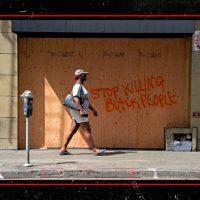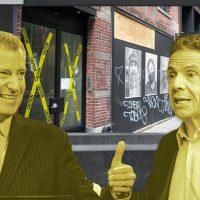Looting and vandalism in cities across the country, which arose alongside peaceful protests for racial justice, have posed another setback for retailers already struggling with the fallout of the coronavirus pandemic.
But damages from civil unrest may prove more manageable than the unprecedented public health crisis in one respect: insurance coverage. While the question of whether coronavirus-related losses should be covered by business interruption insurance remains hotly disputed, the physical damage and loss caused by looting is precisely the sort of thing such policies are designed to cover.
“Damage to the physical part of a business and its contents that is caused by fire, riots, civil commotion or vandalism is generally covered under a standard business owners policy,” wrote the Insurance Information Institute in a report last week. The trade group also noted similar provisions for homeowners and auto insurance.
Losses from looting, like those that accompanied some of the nationwide protests over the killing of George Floyd at the hands of Minneapolis police, can trigger several different types of insurance coverage. That includes coverage for building damage, business property damage, coverage for measures taken to protect property, as well as business interruption, according to a note from law firm Stinson LLP. Some policies do explicitly exclude — or include — civil commotion in their coverage in rare instances.
While the question of whether looting damage is covered by insurance is generally well established, other uncertainties remain. Although landlords tend to require their tenants to buy basic liability insurance at the very least, the amount of coverage can still vary widely, the Los Angeles Times reported.
A typical liability and property coverage package for a small business can cost about $1,200 a year, the Insurance Information Institute’s Janet Ruiz told the Times. “It depends on how much they are willing to spend if they have a loss,” she said. Large retail chains, on the other hand, usually have sophisticated insurance policies that can cover millions of dollars in losses.
In an unfortunate twist, it also appears that many smaller retailers have allowed their insurance coverage to lapse in recent months due to financial pressures caused by the pandemic, according to stories of small business owners reported by news outlets across the county.
Just 40 percent of small and medium-sized businesses are protected by business interruption coverage, the Insurance Information Institute noted in an email to insurance trade publication Claims Journal.
Claim catastrophe
Even with such gaps in coverage, insurance companies are likely looking at hundreds of millions of dollars in claims as a result of the recent wave of protests and looting.
Last week, Verisk Analytics subsidiary Property Claim Services declared the civil disorder in Minneapolis to be a “catastrophe” — implying at least $25 million insured losses — and had extended that designation to over 20 states a few days later.
The most damaging civil disturbance on record was the 1992 Los Angeles riots, which led to $775 million in insured losses at the time, or $1.4 billion adjusted for inflation. That’s more than four times as severe as any other such event, but still miniscule in comparison to other types of catastrophes like hurricanes, earthquakes or the 9/11 attacks, according to an Insurance Information Institute report.
Covid complications
Now that much of the vandalism and looting across the country has subsided, retailers are getting started with the arduous task of preparing insurance claims — collecting invoices on lost merchandise, documenting evidence of property damage and calculating losses caused by business disruption.
That last task in particular is complicated somewhat by the fact that many stores were closed prior to the protests due to coronavirus.
“Even if the business was still shut down or operating at limited capacity due to the impacts of the Covid-19 pandemic, most insurers will determine income loss based on a 12-month assessment of the operation’s income,” Insurance Information Institute told Claims Journal.
But other solutions might also be needed. “We may have to treat it like a newly formed business to put together a reasonable forecast,” Marsh property claims practice managing director Robert O’Brien told CNBC.
Local governments are also stepping in to assist impacted businesses. In New York state, the Department of Financial Services is “directing insurers to expedite claims, provide free mediation of disputes, and accept photos as reasonable proof of loss so businesses don’t have to wait for police reports,” Gov. Andrew Cuomo said Thursday.
New York City has allocated $500,000 in grants for looted stores in the Bronx, including “legal help, help getting their insurance; whatever it takes to get them back on their feet,” Mayor Bill de Blasio said.
And in California, state insurance commissioner Ricardo Lara has called on insurers to move quickly to help affected businesses recover from the riots, the Los Angeles Times reported.
Premium pass-through?
With their multimillion-dollar insurance policies, large retailers targeted by looters have received limited sympathy from the general public. But others have pointed to potential long-term consequences for the insurance industry as a cause for concern.
“Looting is not a victimless crime, as some have tried to argue in defending such behavior,” the Times’ business columnist David Lazarus wrote last week, citing insurance brokers who say they expect rates to rise. “It has very real consequences for business owners and, in turn, their customers. In the long run, we all pay.”
In addition to raising premiums, insurers may also start limiting coverage for riots, civil commotion and vandalism in the future, sources told Claims Journal. And existing problems with coronavirus claims and the impending hurricane season aren’t helping.
But the Insurance Information Institute’s Ruiz told Slate, “generally, catastrophes get looked at more in the long-term average.” She added that “rates don’t go up immediately — only if you were having riots every year.”
More likely, she said, insurance rates will rise simply because of building costs, making the cause and effect relationship with riots and looting unclear. She also expressed doubt that insurance costs would be passed onto consumers.
“If premiums go up, they would have to go up quite a bit to make businesses raise their whole cost. They generally don’t transfer that onto their customers,” she said. “They’re looking at their whole cost to do business, not just their insurance premium.”
Read more




